
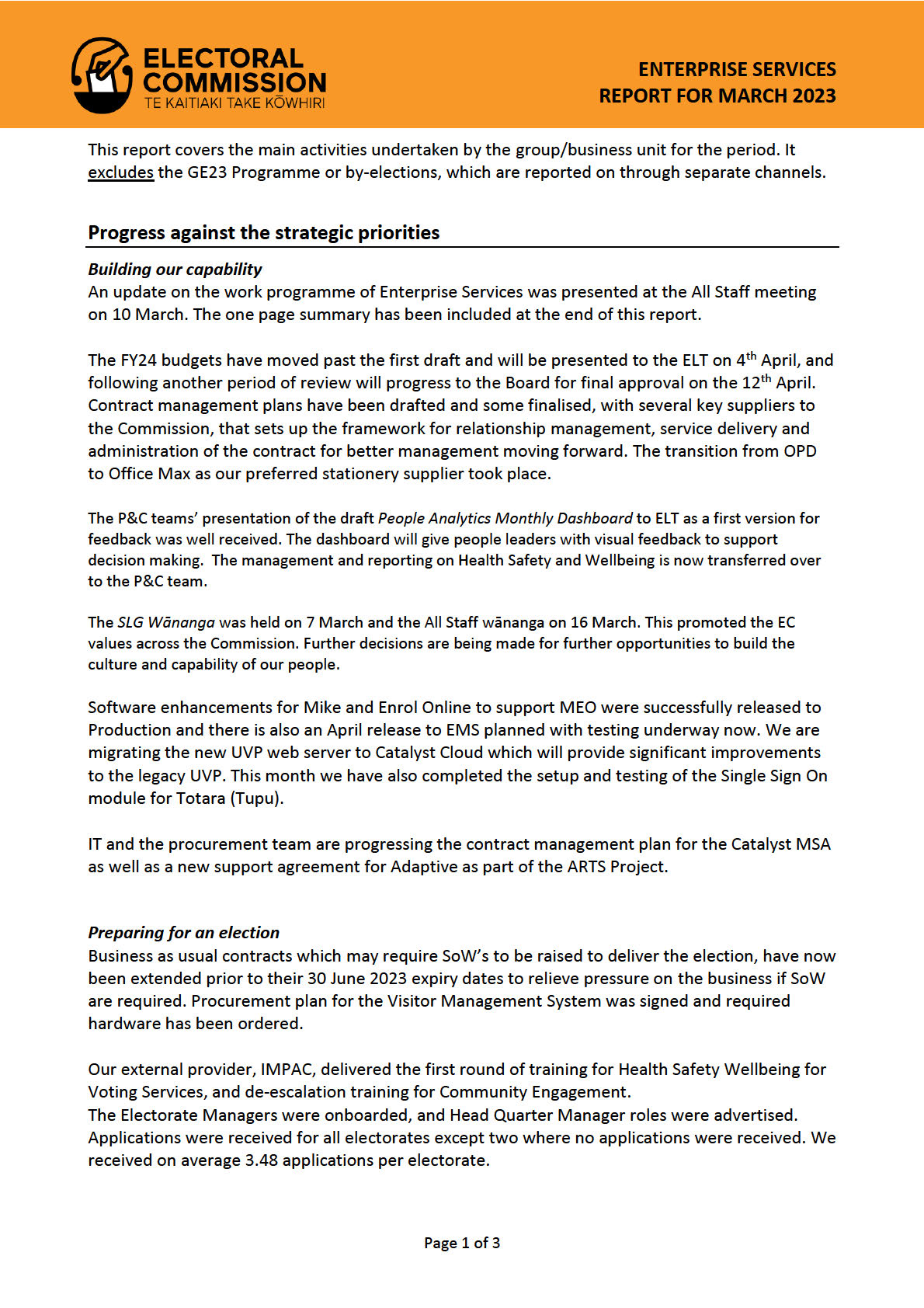
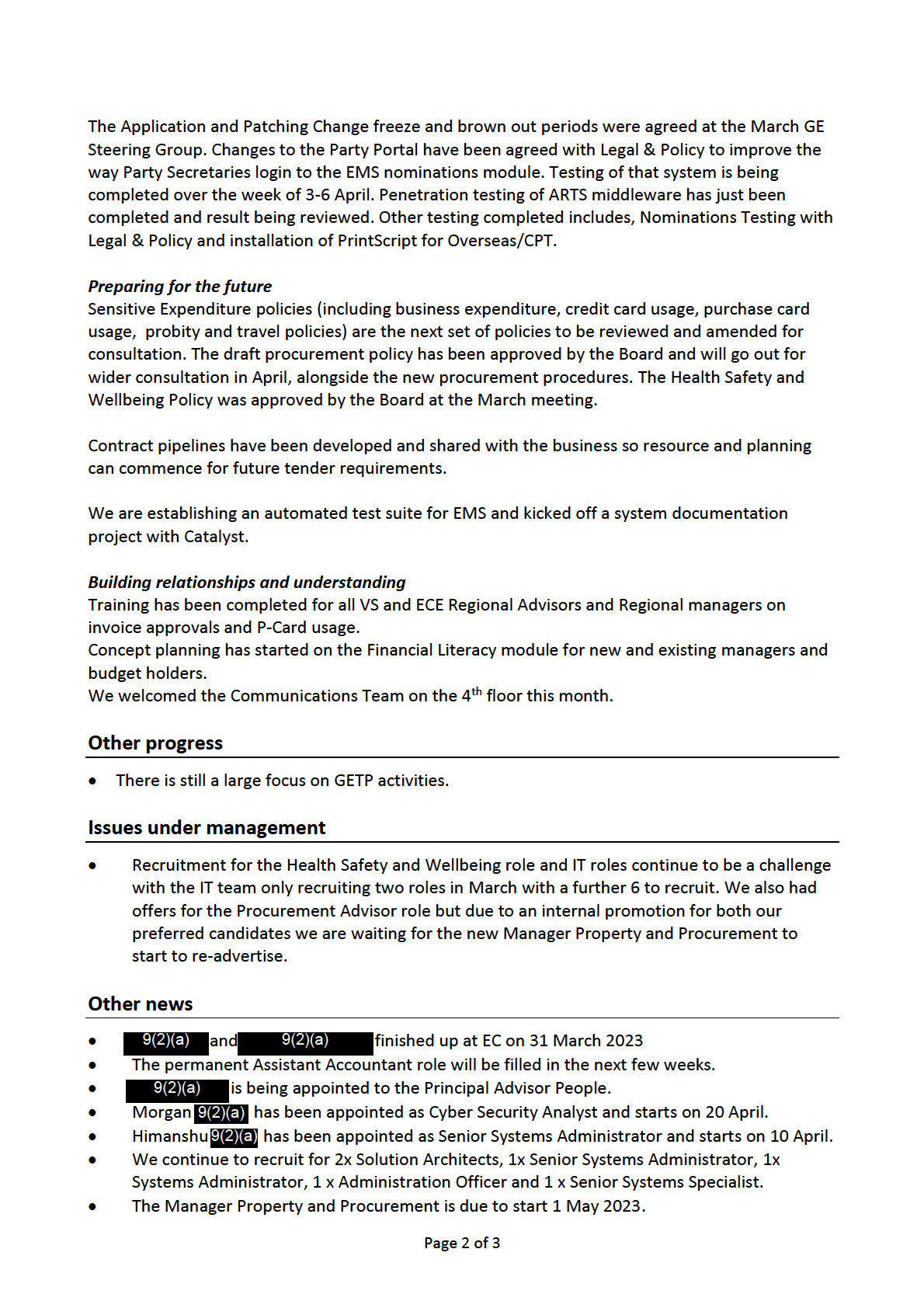

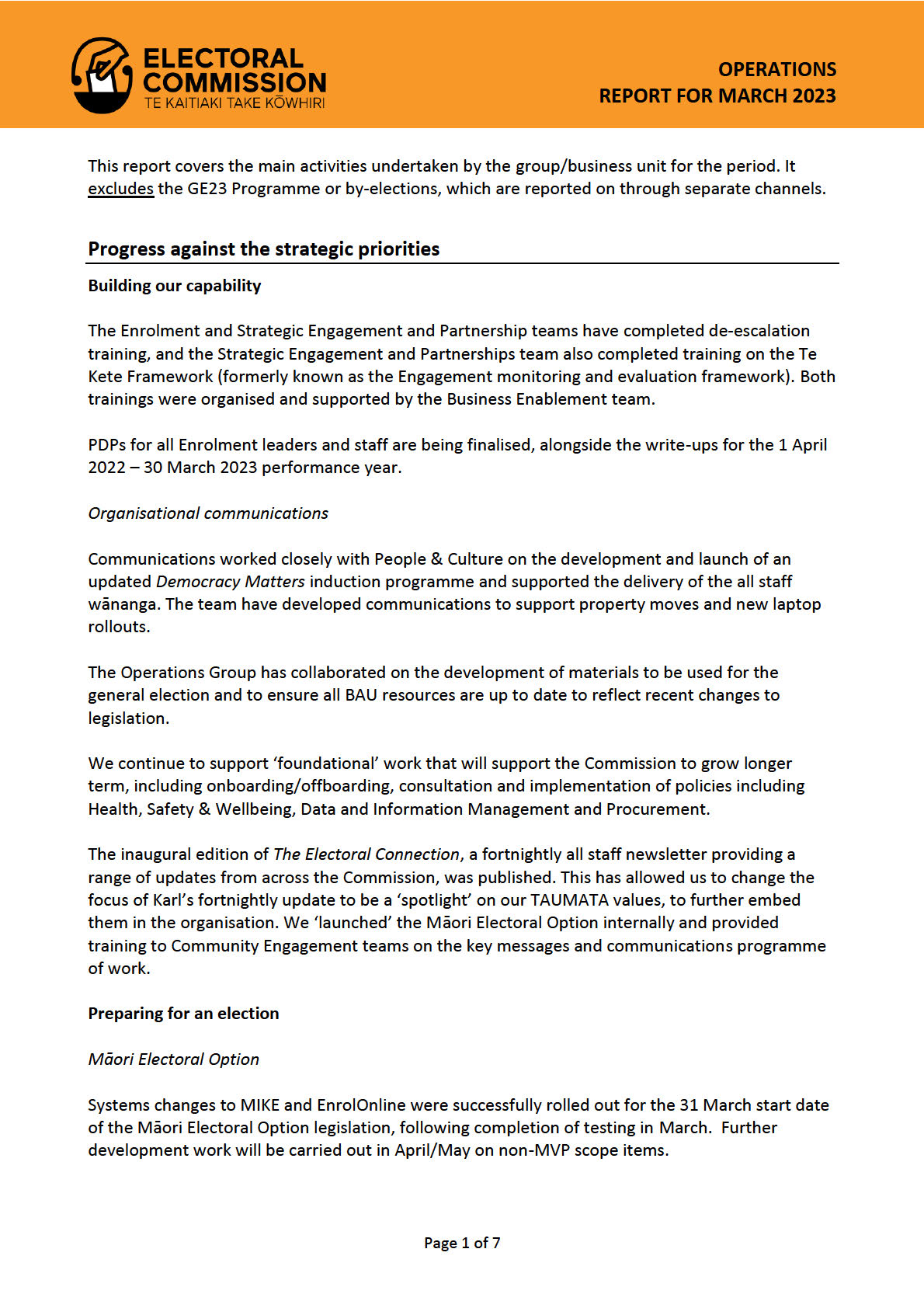
Production of the mailout packs was completed by NZ Post, and approximately 512,000 packs
containing the ROE42 form and MEO brochure will be sent to Māori electors from 1 April. Testing
of macrons by NZ Post using EC data was successfully completed prior to the data extract for the
mailout and macrons have been included in names and addresses for the mailout for the first
time. Changes to the ROE1 enrolment form and ROE9 confirmation letter have also been
implemented, incorporating updates for MEO.
Training for all staff in Enrolment and Strategic Engagement & Partnership staff has been
completed. Training activities covered refresher training for permanent enrolment staff,
enrolment training for the new processing staff in the expanded Auckland enrolment centre, and
engagement training for the additional community engagement staff and for the contracted
community groups. Positive feedback was received from the training participants, along with some
innovative ideas to further improve the training for the General Election. It has also enabled us to
develop our internal capability to deliver specialised training.
Recruitment is ongoing for a further 16 roles, with gaps primarily in the Youth Advocate roles and
Whangarei, Auckland and Wellington regions. Recruitment in Napier has been delayed due to the
impact of Cyclone Gabrielle. Interviews for the contracted Māori community organisations were
held in early March and three groups have been awarded contracts, covering five target areas:
Tuakana Education Limited (Central Plateau/Rangitikei, Whanganui and the River/West Coast),
Eastbay Reap Limited (Murupara/Kaingaroa, East Cape) and Kaupapa Māori Consultants Limited
(Far North/Kaitaia). Training for the contracted groups was held at Te Ao Hou Marae, Whanganui
on 27 and 28 March. Further interviews are planned for two groups to cover South Island regions.
Temporary staff employed by PersolKelly agency started in Auckland (11 x enrolment processing
staff) and Lower Hutt (1 x operations support) on 27 March. Training has been successfully
completed and they will work alongside our enrolment processing teams during the MEO
campaign.
Planning to mitigate the impact of cyclone Gabrielle on the campaign approach in affected areas is
ongoing, with a working group in place reporting to ELT weekly. Temporary approval is in place to
allow Electoral Commission enrolment staff to update an elector’s postal address by email or
phone during the campaign, for electors who are unable to receive their Māori Electoral Option
mail pack in affected areas.
Business Enablement team also worked with Telnet to set up 0800 services for the campaign. This
included setting up a new IVR flow (in English and te reo Māori), confirming required te reo Māori
language capability, training requirements for Telnet Customer Services Representatives, updated
answers to FAQs, and live reporting dashboard of call statistics. Some of these capabilities will be
leveraged for future elections.
The Māori Electoral Option communications programme went live on 31 March. The first message
runs until 15 April to raises awareness amongst Māori about the Option and that an information
pack will arrive in the mail.
The Communications and Education and Māori Advisory teams worked together to finalise key
messages and advertising scripts, to refine the translation process for information in Te Ātiawa,
and to define a process for translating other dialects.
Page 2 of 7
Organisational communications were prepared and delivered so all our people know about the
Option and what it means. These communications included an information hub and articles on
Echo and an all-staff hui to launch the Option.
A media briefing was held in Wellington on Thursday 30 March with the Chair of the Board, Chief
Electoral Officer and Chief Māori Advisor and a media release was sent to national and local
media. This activity generated much interest and stories about the Option. Media training was
delivered to people involved in the media briefing and spokespeople who have been interviewed
by media.
Still photography and video shoots were held on 17 March to capture footage and imagery to be
used for the campaign. This required significant pre-production preparation and post-production
and studio editing to format messages across different media channels.
The media schedule was finalised and approved by the Board and placements were booked across
multiple channels for separate phases of campaign. Media partnerships were also approved and
we’re now working with media organisations to refine their proposals before beginning
production on this content.
Content, translation, design, and architecture for a new section on the Commission’s website
about the Option was completed and the pages were published on 30 March.
Social media engagement increased across the Commission’s social channels on Facebook,
Instagram, Twitter, and YouTube. Questions about the Option are being answered and public
comments on posts continue to be moderated to maintain standards of public decency.
A benchmark survey was undertaken in March to measure awareness and understanding of the
Option before the start of the campaign and will be repeated at the end of the campaign period.
Resources were prepared and delivered to the Commission’s community engagement teams to
support their attendance at events and meetings with stakeholders. These included a campaign kit
and presentation tools.
A letter was sent to all members of Parliament providing an update on the Option and changes to
overseas eligibility and the Commission’s preparations. Information and resources about the
Option are being prepared to help stakeholders spread the word in their local communities.
Filming of the voting place training
Voting Services carried out filming of the process of issuing votes in the voting place last week on
Thursday and Friday. The films are used in both the face-to-face training and eLearning courses by
approximately 20,000 election staff. We are especially grateful to Commission staff members who
volunteered to give up time to be part of the filming and undergo the detailed script training the
week before. Unreal Films our film contractor has been working with us producing these training
films for nearly 20 years now and specialises in producing elections and democracy footage across
the Australasia region.
Always On advertising
Page 3 of 7
The first quarter media schedule for always on activity concluded at the end of March and a
performance report is being prepared. A new media schedule for the second quarter is being
finalised.
Preparing for the future
The Enrolment Team is currently trialling the new Roll Cleanse process and tools, which provides
for a more robust process for identifying and fixing duplicate records in the enrolment system, an
improved capability to identify and respond to trends or systemic issues arising from the roll
cleanse process, and to provide more robust reporting on the numbers of duplicate records, the
actions taken to remedy them and any potentially systemic issues. The process and tools were
created as a result of discovery and development efforts with the Business Enablement team.
The handover of the management of the Māori Affiliation Service (MAS) process from Enterprise
Services to Enrolment has been completed. Work is now underway to ensure the MAS process is
properly documented and ongoing training is developed.
Changes to the Large Print Enrolment Application Form (large print ROE1, which is specifically
designed for the sight impaired) to accommodate the changes relating to MEO and the overseas
eligibility period have been completed. The new form is being printed and distributed through our
partners in the blind and low vision community.
SEP kaimahi have participated in preparatory sessions on the engagement strategy and monitoring
and evaluation framework (Te Kete).
As a whole team the staff had an introductory session on the overarching strategy including
understanding the key components and hearing from OLT members about the value of the
strategy and how it links into their work. This was followed up by regional values sessions where
individual teams focused on how the principles of the strategy can be applied to their work.
Staff were also introduced to Te Kete and will begin utilising the framework as part of their MEO
planning and evaluation.
Business Enablement team worked with procurement to prepare the full procurement plan and
ROI document for the 0800 Information Services. This procurement will be for FY24/25 to FY32/33
and due to the nature and size of contract, the plan will be presented to the April Board meeting
seeking approval to engage with the market.
Building relationships and understanding
Community Engagement staff participated in 62 engagements through March, primarily in person
events, hui and information sessions.
Media
A media conference was held in Wellington on 30 March to support the launch of the Māori
Electoral Option public information programme. It was well attended and gave media the
information they needed to write stories on the changes to the Option.
Page 4 of 7
Karl Le Quesne and Hone Matthews provided comment in English and te reo Māori on what the
changes mean, and how Māori can change roll types if they would like to.
There were news stories on TV3, Prime News, Radio NZ, Whakaata Māori (Māori Television), Te
Karere, the Spinoff, Stuff and the Herald, and syndicated stories appeared in regional newspapers.
Hone has done several interviews on iwi radio in Auckland, Whanganui and the East Coast.
A media release was also issued on the enrolment eligibility changes for New Zealanders living
overseas who have not been able to return home in the last 3 years because of the pandemic.
There has been a lot of media coverage of Stuart Nash’s sacking from Cabinet, and the calls that
followed for him to leave Parliament, and for a by-election to be held in his Napier seat. The MP
intends to stay in Parliament until the election when he will retire, avoiding the need for a by-
election. The reporting shows good understanding in the media of the rules around when by-
elections are held and how much they cost.
Other items of interest in March included election year stories on an increasing number of
donations over $20,000 to parties as they raise funds for their election campaigns, and candidate
selections in electorates around the county.
Strategic communications Stakeholder plans for Community Groups and Tangata Whenua have been progressed and will
shortly be shared with leads for their review. Leads have provided feedback on the Academics and
Experts and Political Parties and Candidates plans. The Public Sector and Media and Commentator
engagement plans have been shared with leads to review.
Stakeholder relationships Parliamentary Service - a meeting was held between the Operations Group and Parliamentary
Services education, communications, visitor services and the Parliamentary Library to discuss
opportunities to work together to share information.
Meta (Facebook and Instagram) - Communications and Legal and Policy met with Meta’s Head of
Public Policy and their Government Relationship Manager, for Australia, New Zealand and the
Pacific to discuss their integrity measures for New Zealand’s 2023 General Election and how Meta
may support our election programme.
Election integrity
Work on our communications activity focused on integrity and building trust and confidence in
elections is continuing. This work is aligned with activity led by the Deputy Chief Electoral Officer
on integrity, security and trust and confidence in the election. The communications team has met
with external agencies including Te Tari Taiwhenua Department of Internal Affairs and Te Tari O Te
Pirimia Me Te Komiti Matua Department of Prime Minister and Cabinet on issues around election
integrity, messaging and ways we will work together on misinformation around the election.
The Group is creating a series of videos to show voters what to expect when they get to a voting
place and how to vote. A videographer has been engaged to create four short videos, and a
location has been secured. Media will be invited to film their own footage that they can use in
news articles about the election.
Page 5 of 7
Election Access Fund communications
Production of advertising to raise awareness of the Election Access Fund amongst disabled people
was completed. People who feature in our advertising about the Fund have lived experience of
disability. Media placement includes radio, digital, and community newspapers throughout the
country. Information about the campaign was shared with key stakeholders including political
parties, the Minister, Steering Committee, Applications Panel and Commission Board ahead of the
advertising going live. Stakeholder resources will be sent out via email and for key stakeholders, a
physical pack in late April.
Websites
The Māori Electoral Option section of vote.nz went live on 30 March with content available in
English, Te Reo Māori and New Zealand Sign Language. As the Option is now continuous, the vision
is for this section to become a permanent part of the website, rather than just for this campaign –
providing an ongoing one-stop shop about enrolment for people of Māori descent. The next stage
for this section is to include an interactive timeline, outlining the history of the Māori vote.
Vote.nz was also updated to inform people about the changes to overseas eligibility – information
about the eligibility extension was already present on the site, but these changes move this from
being a future initiative to a current one.
Work is beginning on the development of a mapping tool to help people apply for voting field
roles. Once complete, this will enable prospective applicants to search for their electorate by
address then apply for roles in their area.
Social Media
The revised social media Best Practice Guidelines for Community Management is being finalised.
Our Social Media Terms of Use, which explain our expectations about public comments made to
our posts or on our social media pages, are being reviewed in line with guidance from Te Kawa
Mataaho Public Service Commission.
A contract has been signed with Sprout Social to provide a social media community management
tool and training has been scheduled with our digital communications team.
Posts about the Māori Electoral Option and eligibility changes for overseas voters were published
to Facebook, Instagram and Twitter. Monitoring and moderation of comments on these posts is
ongoing.
The team worked with the Ministry of Foreign Affairs and Trade’s communications team and New
Zealand’s overseas posts are sharing our social posts about eligibility changes overseas.
The number of people following our social media pages continues to grow. We currently have
46,603 Facebook followers, and 2,724 Instagram followers.
Other progress
Page 6 of 7
Issues under management
•
Planning to support people who do not receive their Māori Electoral Option pack in the mail
because of Cyclone Gabrielle is progressing.
•
Recruitment for community engagement staff to support the Māori Electoral Option
continues to be a challenge. Options have been shared with the Programme Board for
consideration.
•
With more engagement staff likely to be travelling and a noted shortage of rental vehicle
fleet availability we are currently exploring costing for lease cars. Paper to be shared with
DCE.
Other news
•
We continue to monitor community sentiment and needs in cyclone impacted regions. Large
parts of the community are focused on recovery and will have limited capacity to engage
with EC content. Access to some areas is opening through early April and we expect more
insights will be gained from this. We continue to partner with agencies including local
council, Stats NZ, MSD and TPK to share information and learn from each other's
experiences.
•
Recruitment for the Senior Enrolment Officer position in Christchurch is underway. The
advertising closes in mid-April, with an appointment expected by the end of April. There is
also enrolment recruitment under way in Auckland and Lower Hutt to fill vacancies created
by recent resignations. In conjunction with this, three new staff started with the Lower Hutt
enrolment and operations support team in March 2023.
•
Recruitment for the 6-month fixed term Senior Advisor Learning and Development in
Business Enablement team was unsuccessful in the first round. We are currently working
with agencies to attract the suitable candidates.
Page 7 of 7
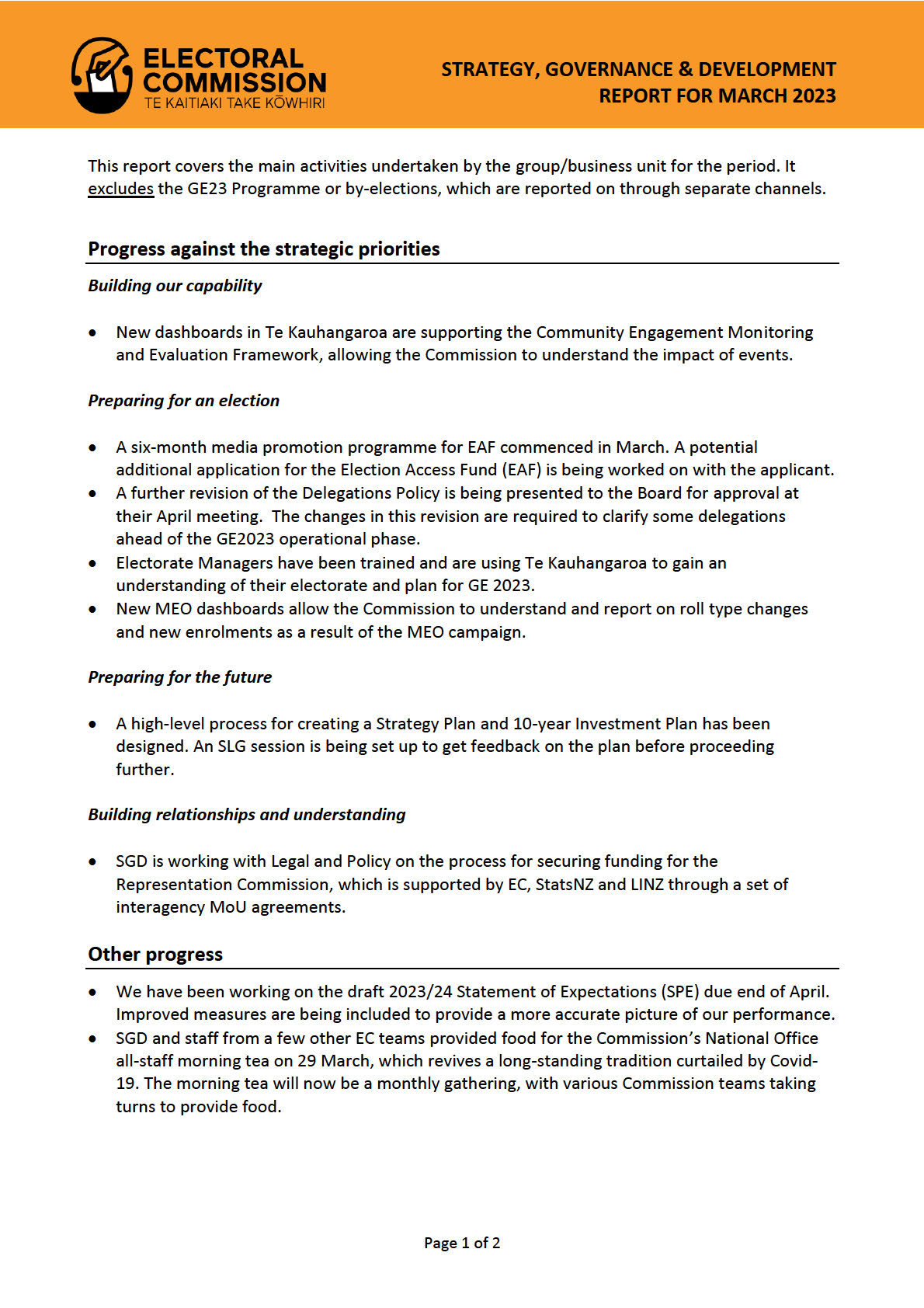
Issues under management
• We have identified an immediate need is to identify senior relationship managers for StatsNZ
and LINZ as a precursor to outdated MoUs and schedules being revised. More generally, SGD
will look to facilitate a discussion at ELT about strategic relationship management, also working
in with the Strategic Partnerships and Engagement and Communications and Education teams.
Other news
•
We are making good progress on a potential appointment to the newly established Manager
Planning, Risk & Assurance role. If the preferred candidate accepts the current offer, they
may be commencing in the role around 8 May.
•
The appointed Senior Advisor Data & Insights will start 17 April.
•
Our international business unit sent their Programme Manager and Technical Advisor to Fiji
this month for the Review Workshop of the 2022 General Election. This was over three days
and went well; great feedback and recommendations were received which will assist them in
their strategic planning for the next election. A vote of thanks was given to the Commission
for our continued support and guidance to the Fijian Elections Office.
Page 2 of 2
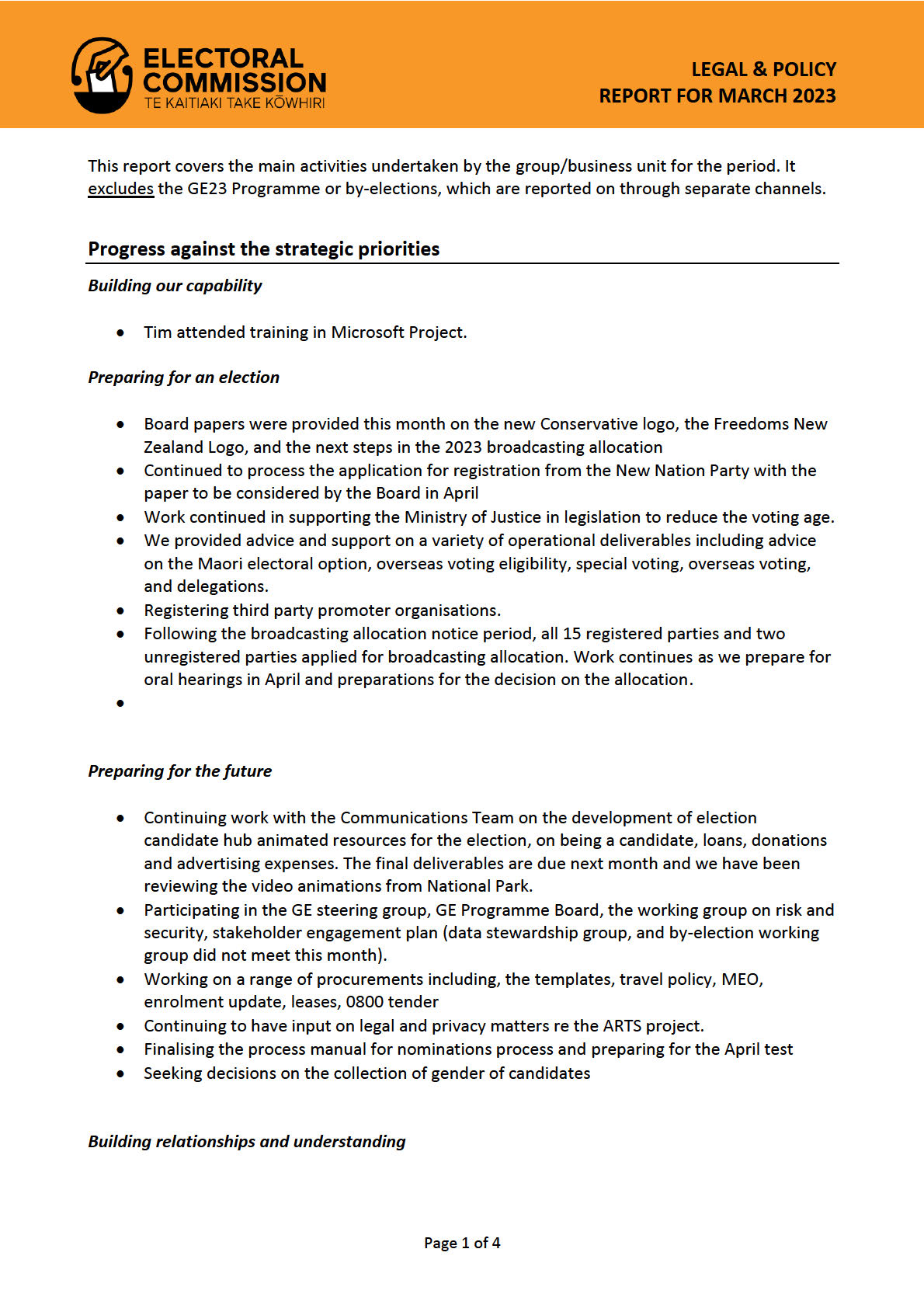

Simeon Brown
How much, if anything, has the Minister's reporting departments,
20/03/2023
agencies or entities spent on external recruitment firms or external
recruiters in the last three years (March 2020 - March 2023); broken
down per month?
Simeon Brown
As at 21 March 2023, for the last six years, how many Public Service 22/03/2023
staff or Board Members that the Public Service Commission's Code
of Conduct applies to, has the Minister been made aware of, who
have, or may have, breached the Code of Conduct?
Simeon Brown
How many domestic flights in total, if any, counting each leg of a
28/03/2023
journey as an individual flight, has each department/entity that the
Minister is responsible for paid for in the period 1 January 2022 to
23 March 2023; and what was the total cost, broken down by
month?
Simeon Brown
What percentage of vehicles owned and/or operated by each
28/03/2023
department/entity that the Minister is responsible, if any, are
equipped with any device which may monitor and record the
vehicles speed?
Simeon Brown
How many international flights in total, if any, counting each leg of a 28/03/2023
journey as an individual flight, has each department/entity that the
Minister is responsible for paid for in the period 1 January 2022 to
23 March 2023; and what was the total cost broken down by month,
destination, cabin class and the purpose of the flight?
Simeon Brown
How many, if any, Koru memberships have been purchased by each 28/03/2023
department/entity that the Minister is responsible for from 1
January 2021 to 23 March 2023; and, for what purpose
Simeon Brown
How many, if any, vehicles owned and/or operated by each
28/03/2023
department/entity that the Minister is responsible for are
designated to an individual person for their use?
Simeon Brown
How many, if any, parking infringements (issued by any local
28/03/2023
authority or private business) have been issued to any vehicle
owned and/or operated by each department/entity that the
Minister is responsible for from 1 January 2022 to 23 March 2023;
listed by location, infringement type, date, fine, and whether the
fine was paid by the individual driving the vehicle or by the
department/entity?
Simeon Brown
How many, if any, vehicles have been purchased within each of the 28/03/2023
previous three financial years for each department/entity that the
Minister is responsible for; listed by vehicle type, make, model, date
purchased and cost?
Simeon Brown
How many, if any, infringement notices issued by the New Zealand 28/03/2023
Police have been issued to any vehicle owned and/or operated by
each department/entity that the Minister is responsible for from 1
January 2022 to 23 March 2023; listed by infringement type, date,
fine, and whether the fine was paid by the individual driving the
vehicle or by the department/entity?
Issues under management
Page 3 of 4
Nothing to report.
Other news
Nothing to report.
Page 4 of 4







